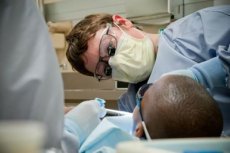New publications
Dental surgeon
Last reviewed: 03.07.2025

All iLive content is medically reviewed or fact checked to ensure as much factual accuracy as possible.
We have strict sourcing guidelines and only link to reputable media sites, academic research institutions and, whenever possible, medically peer reviewed studies. Note that the numbers in parentheses ([1], [2], etc.) are clickable links to these studies.
If you feel that any of our content is inaccurate, out-of-date, or otherwise questionable, please select it and press Ctrl + Enter.

A dental surgeon is a doctor who specializes in operations in the oral cavity.
Who is a dental surgeon?
A dental surgeon is a doctor who specializes in jaw and facial surgeries related to the treatment of injuries and congenital and acquired defects. Together with a craniofacial surgeon, a dental surgeon corrects congenital and acquired facial defects. Together with a surgical oncologist, he or she removes benign and malignant tumors of the jaw and oral cavity. He or she only removes teeth in extreme cases when therapeutic treatment methods are ineffective: with periodontitis, improper eruption of wisdom teeth, with severe destruction of the crown, when prosthetics are impossible (there are no supporting teeth for the prosthesis, there is no possibility of installing a dental implant).
When should you see an oral surgeon?
A dental surgeon can help you with deep caries complicated by pulpitis, with an exacerbation of periodontitis, if a wisdom tooth injures the cheek or if the tooth is very mobile with periodontitis. A minor surgical operation in the oral cavity can help you with partial eruption of wisdom teeth. If you have injured a tooth, jaw or oral mucosa, if you have a purulent complication of oral diseases (abscess or phlegmon), you also need the help of a dental surgeon. A dental surgeon also implants supports for artificial teeth into the jaw. An orthodontist can refer you to a dental surgeon, since there may not be enough space in the dental row for the normal arrangement of teeth when correcting the bite.
What diagnostic methods does a dental surgeon use?
Before any operation, a general blood test and an HIV test are taken, and, if indicated, allergy tests for local anesthetics and general anesthetic drugs are taken. Bacteriological culture is mandatory to avoid infection.
In his work, a dental surgeon uses visual examination, radiographic methods of examining the dentition, MRI, and CT of teeth to correctly establish a diagnosis and carry out adequate treatment.
What diseases does a dental surgeon treat?
A dental surgeon performs tooth-preserving procedures, treats such inflammatory processes of the oral cavity as periostitis, osteomyelitis of the jaw, abscesses and phlegmons), benign and malignant tumor formations of the oral cavity, and performs tooth extraction. This specialist also prepares the oral cavity for prosthetics, performs primary surgical treatment of wounds of the facial area and neck, reconstructive surgeries on the upper and lower jaws, and periodontal tissues.
Advice from a dental surgeon
The dental surgeon will explain to you at the appointment how to avoid having to see him again. To avoid having to remove teeth, you need to take care of their health from an early age. Periodontitis, if it has happened to you due to poor oral hygiene, is curable in the early stages, you can avoid losing teeth if you contact the dentist for therapeutic help in time. After tooth extraction1 without subsequent implantation, problems with the bite and gastrointestinal tract inevitably begin. Remember that your own treated tooth is always better than a beautiful artificial one! So today the standard of dentistry is to fight for every tooth to the last. For people with periodontal diseases, a periodontist selects a toothbrush, paste, and other hygiene products, who must be monitored throughout life after periodontitis and periodontosis are detected. Thanks to his efforts, you can stop the process of destruction of gums and bone in these diseases and save your teeth. Eat foods containing calcium and phosphorus: river fish, cottage cheese, buckwheat, kiwi, drink milk. Apples, radishes and other hard vegetables and fruits stimulate salivation, helping to wash away plaque from teeth. Chewing gum does not replace brushing your teeth, but only restores the acid-base balance in the oral cavity, which helps suppress the proliferation of bacteria. After eating, rinse your mouth with alkaline mineral water. The goal is the same - to prevent the destruction of tooth enamel by acids. But remember that rinsing can never replace brushing your teeth.
Alkaline foods such as cucumbers and watermelons are good for dental health.
Teeth and gums should be treated before pregnancy. Modern painkillers do not harm the child if they have to be used during pregnancy.
Smoking has a negative effect on gums, as nicotine causes spasm of the blood vessels of the gums.
Cracked enamel, periodontal disease and pregnancy are contraindications to the currently popular whitening procedure.
Have you ever thought about how to store a toothbrush correctly? Only in an open position and with the bristles facing up, and not in a solution of soda or potassium permanganate and with the bristles facing down, as many do. This is wrong. It is better to choose a toothbrush made of synthetics than of natural bristles - bacteria multiply faster on such.
A dental surgeon helps to cope with oral cavity problems where therapeutic treatment methods no longer provide the desired effect.
 [ 1 ]
[ 1 ]
